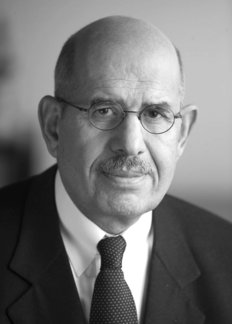Mohamed ElBaradei
Biographical

Dr. Mohamed ElBaradei is the Director General of the International Atomic Energy Agency (IAEA), an intergovernmental organization that is part of the United Nations system. He was appointed to the office effective 1 December 1997, and reappointed to a third term in September 2005.
From 1984, Dr. ElBaradei was a senior staff member of the IAEA Secretariat, holding a number of high-level policy positions, including Agency’s Legal Adviser and subsequently Assistant Director General for External Relations.
Dr. ElBaradei was born in Cairo, Egypt, in 1942, son of the late Mostafa ElBaradei, a lawyer and former President of the Egyptian Bar Association. He gained a Bachelor’s degree in Law in 1962 at the University of Cairo, and a Doctorate in International Law at the New York University School of Law in 1974.
He began his career in the Egyptian Diplomatic Service in 1964, serving on two occasions in the Permanent Missions of Egypt to the United Nations in New York and Geneva, in charge of political, legal and arms control issues. From 1974 to 1978 he was a special assistant to the Foreign Minister of Egypt. In 1980 he left the Diplomatic Service to join the United Nations and became a senior fellow in charge of the International Law Program at the United Nations Institute for Training and Research. From 1981 to 1987 he was also an Adjunct Professor of International Law at the New York University School of Law.
During his career as diplomat, international civil servant and scholar, Dr. ElBaradei has become closely familiar with the work and processes of international organizations, particularly in the fields of international peace and security and international development. He has lectured widely in the fields of international law, international organizations, arms control and the peaceful uses of nuclear energy, and is the author of various articles and books on these subjects. He belongs to a number of professional associations, including the International Law Association and the American Society of International Law.
In October 2005, Dr. ElBaradei and the IAEA were jointly awarded the Nobel Peace Prize for efforts “to prevent nuclear energy from being used for military purposes and to ensure that nuclear energy for peaceful purposes is used in the safest possible way.” In addition, he has received multiple other awards for his work. These include the International Four Freedoms award from the Roosevelt Institute, the James Park Morton Interfaith Award, and the Golden Plate Award from the Academy of Achievement. Dr. ElBaradei is also the recipient of a number of honorary degrees and decorations, including a Doctorate of Laws from New York University and the Nile Collar – the highest Egyptian decoration.
Dr. ElBaradei is married to Aida Elkachef, an early childhood teacher. They have a daughter, Laila, a lawyer in private practice, and a son, Mostafa, a studio director with a television network, both of whom live and work in London, England.
This autobiography/biography was written at the time of the award and later published in the book series Les Prix Nobel/ Nobel Lectures/The Nobel Prizes. The information is sometimes updated with an addendum submitted by the Laureate.
Nobel Prizes and laureates
Six prizes were awarded for achievements that have conferred the greatest benefit to humankind. The 12 laureates' work and discoveries range from proteins' structures and machine learning to fighting for a world free of nuclear weapons.
See them all presented here.
